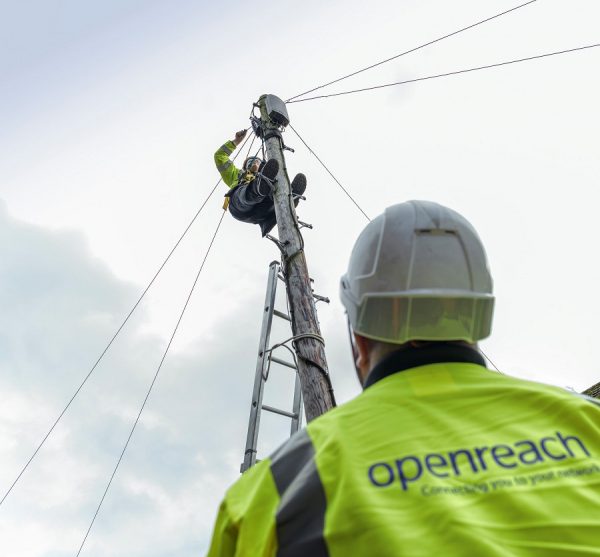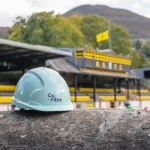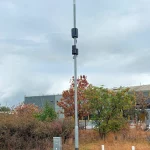Openreach Faces Protest in Lincoln Over Rollout of 40 Broadband Poles

The Street Works and Permitting Manager at Lincolnshire County Council (LCC) in England, Ashley Behan, has asked network access provider Openreach (BT) to “pause” the roll-out of 40 new telecoms poles – needed to expand the coverage of their full fibre (FTTP) broadband network – until they can explain how they’re going to respond to local complaints and engage with the community.
The use of poles to run overhead cables (telecoms, electricity etc.) is a common practice across the UK, where millions have been used over the decades. This is because poles are quick and cost-effective to build (several times cheaper than trenching), can be deployed in areas where there may be no space or access agreement to safely put new underground cables, are less disruptive (avoiding the noise, access restrictions and damage to pavements of trenching) and can be built under Permitted Development (PD) rights; often with only minimal prior notice.
However, many people dislike poles – usually due to their negative visual impact and the lack of prior consultation before deployment, which in some cases has occasionally even erupted into disruptive protests. The latter is most likely to occur in areas that haven’t previously had poles before (i.e. past cables were underground), as well as areas of outstanding natural beauty or where several gigabit broadband networks may already exist.
Advertisement
As the Independent Councillor for the City of Lincoln Council, Biff Bean, said of Openreach’s new deployment in the Birchwood and Hartsholme areas (BBC News): “[Poles are] antiquated, old-fashioned 1950s-style technology. We don’t want our communities covered in them, especially when the option’s there to bury the cables. Openreach have got to take residents’ objections into account, not railroad them through.”
The current Labour-led government, much like the previous Conservative-led one, recently responded to this by calling on broadband operators to “end the deployment of unnecessary telegraph poles” (here), to “share existing infrastructure when installing broadband cables as the default approach” and they also pledged to foster a “revised” code of practice.
Following the code
At issue in Lincoln seems to be the question of whether or not Openreach are following the industry’s new Best Practice Guidance on Poles, which was published earlier this year. The new guidance outlines “mandatory obligations and best practice recommendations“, including notification requirements, height restrictions and regulations for natural and protected areas, making these easier to understand for everybody.
The new guidance also recommended that providers engage much more closely with communities prior to deployment and to consider the visual impact of their fibre roll-out. But Ashley Behan indicates that Openreach have not yet explained “how they’re going to engage with the community as part of the best practice guide that they’re signed up to” and should thus “pause” their deployment until they can do so.
Advertisement
A spokesperson for Openreach said:
“We’re listening to concerns raised locally and have already arranged meetings with the MP and council to explain our plans in more detail and hear feedback directly.
Our engineers always aim to use existing infrastructure wherever possible to minimise disruption, and we keep new poles to a minimum. However, in some areas, they’re the only way to connect everyone – especially where underground options aren’t viable.
There is strict guidance in place, and we always follow the correct processes whenever we need to put a new pole in place.”
Just to be clear. Openreach aren’t breaking any hard rules with their approach (it is not a solid requirement to consult the community prior to build), but they are perhaps at risk of damaging the credibility of the industry’s new guidance by not following its recommendations as closely as they perhaps could. Failing to do so risks reopening a can of worms and thus leading to stricter measures from the government.
The council’s Ashley Behan went on to explain how the local authority would thus like Openreach to engage in “extra community engagement, letter dropping, speaking to community leaders so that the community understand what’s going to be taking place in their streets“.
The government are currently assessing the impact of the aforementioned guidance before deciding whether further action may be required. But it should be noted that many operators have since had to scale-back their fibre deployments due to wider economic and competitive pressures (i.e. there are now fewer complaints being raised), which is the main reason why we aren’t seeing as many complaints this year as last.
Naturally, network operators have a difficult balancing act to perform, which is one that both needs to respect the government’s wishes (inc. local communities), while at the same time trying not to damage the wider roll-out and their already strained cost models. Not forgetting that consumers and businesses with access to more than one gigabit broadband network will often directly benefit from greater choice and lower prices.
Advertisement
Mark is a professional technology writer, IT consultant and computer engineer from Dorset (England), he also founded ISPreview in 1999 and enjoys analysing the latest telecoms and broadband developments. Find me on X (Twitter), Mastodon, Facebook, BlueSky, Threads.net and Linkedin.
« ISP KCOM Start Black Friday SALE on UK Broadband Packages





















































Obviously Openreach aren’t going to stoke the fire but the obvious remedy is for the local council to fund the civils or if an Altnet is available simply move on to other areas in their rollout. OR will continue to provide FTTC for now assuming rural in the area already have poles.
I am assuming directly buried copper or span length issues.
I am sure Openreach can arrange presentations and the council can poll residents views rather than those vocally protesting.
Cityfibre and VMO2 are both on the estates and both are presumably underground so Openreach’s case is hard to make.
Openreach did the same in Southport, Sefton MBC. Their Director, Mr Thorburn, told the councillors and senior Sefton Officials, they would not install poles in the Southport area, in July. Some 7 days later they tried to install a pole on the highway, without any public consultations, or even informing the council with work permit applications/ or notices. it was installed and when the Council found out, it was removed in 4 hours.
Looks like the areas in question are already covered by VMO2 DOCSIS so poles are going to be a much harder sell. No doubt the previous copper lines are direct dig. Time Ofcom made VMO2/Nexfibre open up their PIA assuming duct space is available.
Quite right.
Also looks like it’s covered by CityFibre & I presume their deployment is underground so Openreach definitely on a sticky wicket if they have done a underground install.
The public: “We demand faster and more capable broadband, we want it now, and we want it at the same price we’ve paid for the last twenty years!….. No, not like that.”
Spot on!
We face the Bizarre situation in rural Gloucestershire here. Of having an Alt-Net Gigaclear having laid all it’s FTTP network underground. And BT / Openreach committed to re-using 1930’s style Telecom poles, when it finally replaces Local Copper. A project, Openreach hasn’t even started yet. And has provided no commencement date for…
We have a similar roll-out in South Leicestershire. GigaClear come along and do their provision – One grey Cabinet serving 3 village cores, everything else underground in BT/OR ducts except a few yards of ducting they installed due to the OR duct being full. GC then used the BT/OR poles as distribution points.
At least if Openreach install the poles then anyone can use them! Probably all no duct areas.
I thought poles had been replaced with underground cables decades ago
Depends on the area, loads of poles around here, I suppose I don;lt notice them as I have lived in streets with poles since I was born. Putting fibre underground costs more money, if people want to have FTTP at an okay price then they need to put up with poles.
But he will be the first to moan about his lack oc fttp acess.
And yet they would complain if there broadband was down
Thr argument about telegraph poles being old technology is a strange one. The alternative, holes in the ground, have been around since the stone age.
Lets hope the independent councillor has got deep.pockets as the cost of undergrounding will.prob be triple that of policing or more
ISP continues with , the use of telegraph poles is common practise, well surely the country had moved on since then , infrastructure being installed underground but now the practise sadly resurrected with a vengeance on our streets , duplicate and triplicate telegraph poles in some areas with all their impacts
It’s not that suddenly people do not like telegraph poles rather it is the forced unnecessary infrastructure on our streets with little or no consideration for our home environments and communities and little or no public engagement prior to the installations. Best practise guidelines which are voluntary and only a consideration are proving to be a paper excercise to attempt to placate residents we have been listened to but this is sadly not the case. If we were listened to surely the flood of unnecessary infrastructure would not be here with all the impacts of affecting visual amenity and accessibility of our footpaths and I wouldn’t be posting this . Let’s hope the government will see that code operators are not responding ,adopting best practise and will take stricter action. Without amendment to permitted development for telecommunications installations to halt this obscene overbuild of infrastructure in Urban areas that have FFTP accessible infrastructure that should be shared our home environments are at the mercy of poor practitioners
I can assure you, if the option to go underground was there they would use it.
Often poles are used because :
A: duct is owned by another network and they refuse access. (most common)
B: the area has no ducts and installing one can be costly.
However we can’t do a ‘vanity project’ in place of full fibre.
If those who can only get fttc are losing out due to vanity projects of not visually liking poles then good luck when vdsl is eventually switched off.
I live in an mdu, same thing. Management company did not want fibre because the wires and holes are bad. In the end they agreed
@Benjamin VMO2 and CityFibre are both available on the estates in question and presumably both underground so the estates already have a choice of gigabit networks so the Openreach case is harder to make in this case.
VMs ducts will be a nightmare; silted up and full of coax cables.
People have Cityfibre, a superior symmetric fttp, with many wholesale ISPs on board, including Sky. A lot do not have in contract price increases.
The residents complaining probably couldn’t give a hoot about BT as even their Virgin service will go fttp by 2028 do they will have 2 fttp providers. BT just want to get in there quick with the poles to prevent competition eroding their customer potential. BT already admitted that ALTNETS are biting into customer numbers, moreso in areas they aren’t in.
@Big Dave
I agree however VMO2 aren’t wholesale. (if it HFC).
Cityfibre ok understood thats there. However not everyone uses it.
although to be fair only plusnet/BT/EE will suffer as they don’t use it.
however as a major network, IMO I would still welcome it over a ‘vanity project.
I guess we are all different. – I grew up living in a house that was fed by a pole both power and Telephone (parents still live there). So it doesn’t actually bother me.
the question is why aren’t cityfibre letting OR use their duct then?
@Benjamin, We too are served by poles but my point stands, if CityFibre (which most major ISPs outside of BT Group use) and VMO2 can build underground then Openreach have a much harder case to make for poles especially in this case only where BT are the only ones likely to be using them because the likes of Sky, Zen & Talk Talk will certainly be preferring CityFibre.
Still choice is king blocking openreach is in my view anti-competative. any VDSL customers with EE/Plusnet/BT will have to leave and go elsewhere for FTTP with no direct upgrade.
should be about choice.
Choice and BT in the same sentence?
They got to the party late then expect to elbow out the competition by putting in sub-standard poles and spaghetti wiring from them, whilst the competition went to the expense to do it properly. They are only wanting to get in there quickly NOW to try and rescue FTTC/ADSL customers onto BT FTTP….
@FA – it’s not BT, it’s Openreach with loads of ISPs.
We know that. Openreach is still BT, just operated at arms length. You really think there isn’t chat and influence between the two? I know how this works in reality…..Anyone using Openreach is aware of wholesale ISPs operating on it. It’s been the model since ADSL.
Extraordinary. Councils should not be allowed to impose costs on businesses for trivial reasons.
The apparent justification:
“antiquated, old-fashioned 1950s-style technology.”
… is somewhat ridiculous given that there are already telegraph poles present on both housing estates.
Planning control is the job of the council. It’s supposed to listen to residents feedback and take action if required.
You can’t let any business do what they like without controls and rules.
The competition buried their cables and as I said in an earlier post, residents already have a superior symmetric service from Cityfibre with VM to follow their upgrade of coax to fttp by 2028. Most won’t give two hoots about BT.
And it’s not just poles, it’s the spaghetti wiring of pole to pole and fibre connections from CBT as well as old copper left in situ as most engineers dont have the time, ir door just plain lazy, to remove thd old copper cable when connecting fttp drop cable to house.
yes, such a bizarre claim. how is digging trenches modern?
In many cases the copper dropwire doesn’t belong to the company the technician installing the fibre drop cable works for. It’s frowned upon to remove cables belonging to other companies, because often one dropwire serves two properties where houses have been converted to flats.
That’s all changed a while ago. Altnets can now remove the BT copper drop cable when connecting fibre up.
@FANNY ADAMS:
BT Group has the right to compete in the area. They also have the right to deploy new poles under existing terms. The council’s response is just backwards-looking.
@FANNY ADAMS:
“spaghetti”
Utter nonsense.
@Far2329Light, you must have lived a sheltered life.
Were you to go into areas where BT have deployed via poles, you will see a rats nest of cables, old copper and new fibres – with the latter going from pole to pole, and pole to house (which increases with customer take up.)
Add in some areas, ALTNETS using BT’s poles and the situation multiplies quickly. Suggest you get out and about more before posting 🙂 Often it is the wiring going past people’s windows or cutting across their front gardens that is the issue. A neighbour can end up having a copper drop cable, a BT fibre cable and 1-2 other ALTNET drop cables over time where they switch around. If the cables come over your front garden from the pole, thats several just to the one property let alone other houses sharing the route.
@FANNY ADAMS:
The claims about the management of Telegraph poles is clearly not the case.
These installations are well-maintained. If there is anything out of place, it is corrected.
It would be nice if there were some actual street names to look at. It seems parts of Birchwood do have overhead cabling, so Openreach might be justified in reusing that (even if a few more poles need to be added)
If it’s in areas where poles already exist that’s one thing, doing it where 2 underground networks already exist and there are no poles is a much harder sell.
@Big Dave:
If the network provider does not have access to existing ducts, it can hardly be criticised for constructing an alternative.
@big Dave So duplicate or triplicate sets of telegraph poles is acceptable is it ?
If Openreach poles exist there won’t be duplicate or triplicate poles as any altnets will be using them under PIA, indeed MS3 use Openreach PIA when installing in Non Kcom areas. Personally I think more 2 Gigabit networks in most suburban areas will prove to be unsustainable anyway.